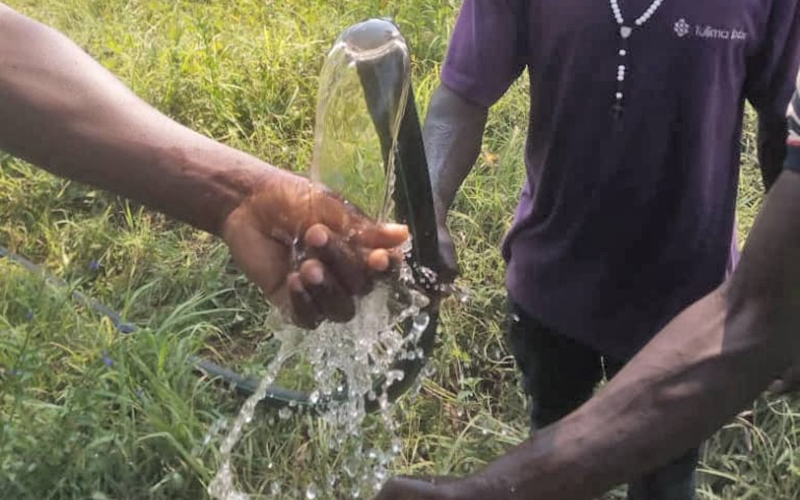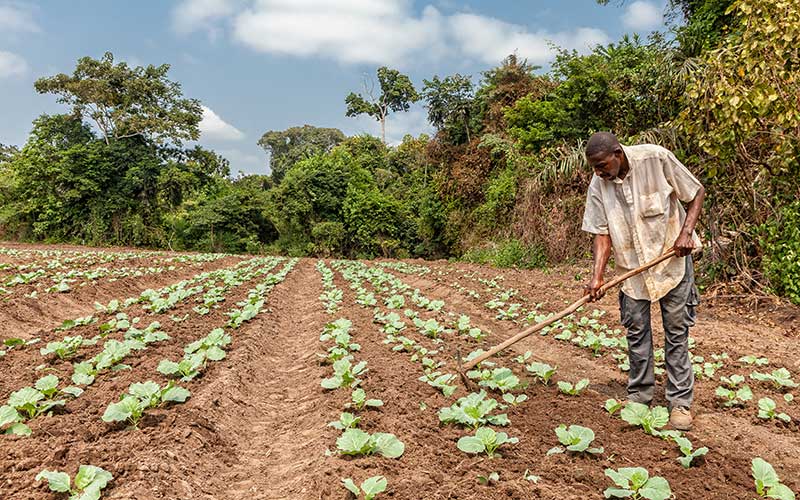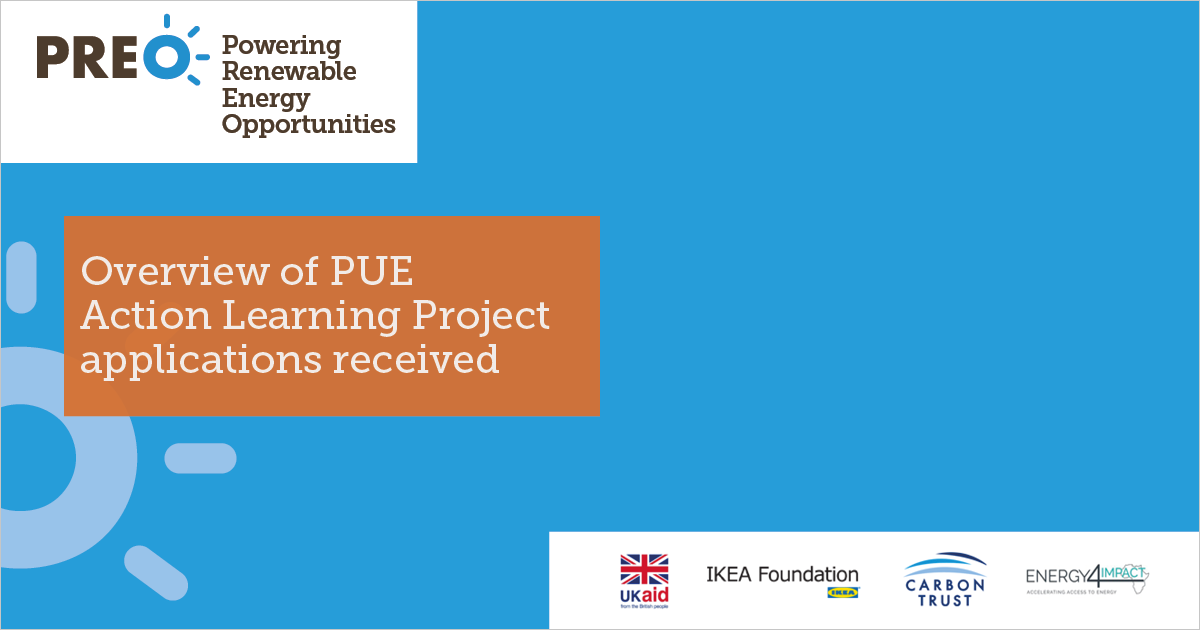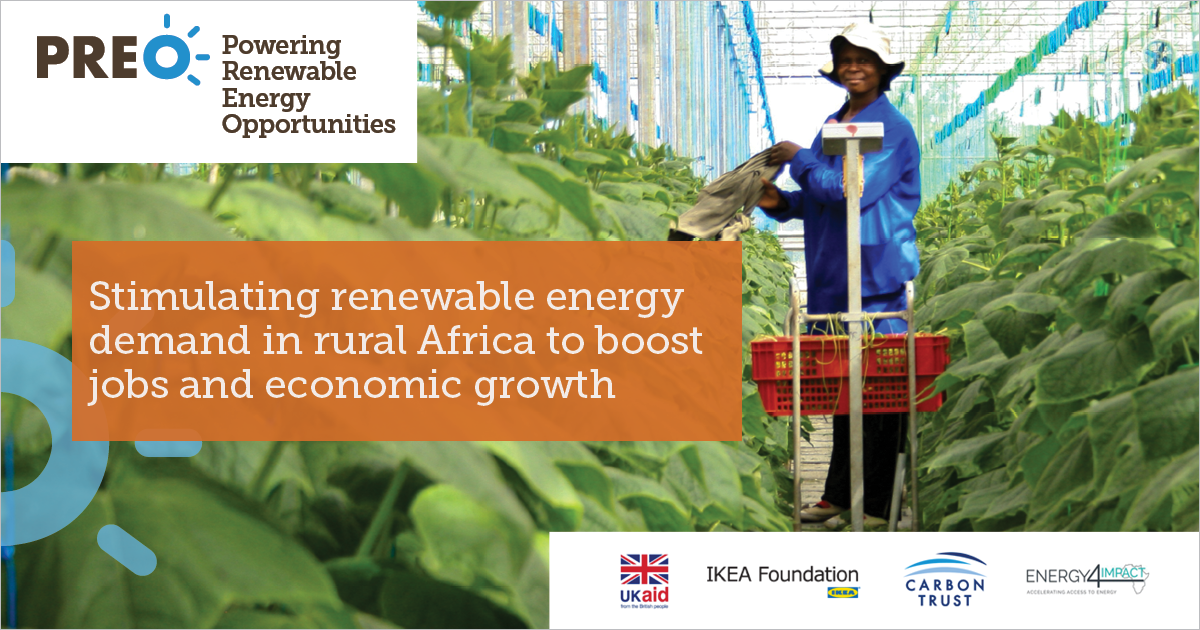
PREO’s blended finance strategy sets tone for private capital investment for early-stage companies in Africa
In 2015, all United Nation Member States pledged to end poverty and protect the planet by 2030, through a coordinated universal agenda that involved the 17 Sustainable Development goals (SDGs). Before the global COVID-19 pandemic hit, the estimated annual financing gap for meeting this agenda in developing countries alone amounted to $2.5 trillion. And, according to OECD Global Outlook 2021, this funding gap may have increased by another 70% driven by the necessity to divert financing to meet COVID-19 emergency response needs. This widening of the financing gap has highlighted the need to diversify finance flows and that by relying on public resources alone we risk failing to achieve SDG targets. There is an urgent need to attract private capital into the relatively young companies and emerging business models needed to deliver a just transition by de-risking their inflows.
Over the past two years, PREO(Powering Renewable Energy Opportunities) has demonstrated a blended financing approach in which donor capital is used to buy-down the demonstration risk associated with early-stage business models, thus lowering the investment risk and improving the risk-return profile for incoming private capital investors.
PREO is a €20 million progamme co-funded by the IKEA Foundation and UK aid via the Transforming Energy Access platform, that deploys high-risk catalytic grant capital – along with technical assistance, knowledge management, data platforms and strategic engagement advisory services – to demonstrate the viability of productive use of energy (PUE) business models in sub-Saharan Africa.
PREO has successfully used blended finance to support innovative PUE enterprises which were struggling to raise finance during their business model demonstration phase. The innovators are able to direct the PREO grant funding to cover the CAPEX of initial field units, cover operational expenses, build capacities, design information systems and generally to absorb unit-level losses to ensure financial sustainability. As a result, the innovators successfully demonstrate positive unit- economics, refine and improve the business model, and gather critical business data needed back up the business plan and attract sufficient commercial capital that would otherwise materialise far more slowly.
One of the companies that successfully went through this process is SokoFresh, a business built on the belief that the barriers to providing accessible cold storage to smallholder farmers are not down to technology, but down to the business model. SokoFresh built a market-linkage service layer over and above the cold storage service, transporting the produce to markets and selling it through pre-agreed contracts to buyers on behalf of smallholder farmers. When SokoFresh applied for PREO funding and support in 2019, the company was just out of the concept phase and had identified the technology partners, value chains and the regions. PREO helped SokoFresh to procure the cold storage technology, build a Minimum Viable Product (MVP) for its market-linkage platform, and get the concept from paper to reality. SokoFresh onboarded around 1,500 smallholders, traded more than 110 tonnes of produce, demonstrated reduction of post-harvest losses to less than 2% vs a 30% baseline, and collected critical unit economics data.

The evidence and data collected through the PREO project, enabled SokoFresh, to raise €892,676 in scale-up capital from both performance-based and private sources, generating a leverage of 5.2x on the PREO funding.
Overall, of the 12 enterprises (two of which are non-profits) that PREO supported in 2019-20 period, seven have successfully raised scale-up capital amounting to €15.6m, generating an average leverage of 7x on the €2.26 million disbursed in the form of grants.
Another big step for the 2020 cohort was in e-mobility, where PREO supported OPIBUS and MobilePower. In November 2021, OPIBUS, the largest manufacturer of electric vehicles in East Africa, raised growth capital through a $7.5 million round, which at the time was the largest fundraise ever in e-mobility in sub-Saharan Africa. Today, OPIBUS is developing products in three main sectors – electric motorcycles, electric commercial vehicles and charging solutions –, and PREO played an instrumental role in rolling out its first batch of 150 e-motorcycles. OPIBUS used PREO grants to get the e-motorcycles to the market as quickly as they could, test the user perspective of the product, build local supply chain ecosystem, invest in product design, and improve manufacturing capacities. During the project period staff headcount grew from 37 to 90 with 91% of Kenyan employees and 40% women.

Within the e-mobility sector, companies supported by PREO adopted a variety of promising business models, to achieve shared goals of improving health and reducing emissions. While OPIBUS aims to become the largest manufacturer of e-vehicles in Africa, Mobile Power, is building a battery management platform that it could lease out to e-mobility companies.

With funding from PREO, Mobile Power developed a multi-purpose 1kWh battery called the MOPOMAX and successfully demonstrated its e-mobility use case in Sierra Leone by rolling out 17 e-motorcycles powered by solar in off-grid and weak-grid areas. In addition to e-mobility, MOPOMAX is gaining traction in use cases such as diesel generator replacement, energy access, and powering productive use equipment. Data gathered from the PREO project has helped Mobile Power mobilise €5.5 million in growth capital including a £1.9 million in Series A funding lead by Camco REPP and RBF from Beyond the Grid Fund for Africa (BGFA).
In addition to supporting early-stage enterprises, PREO, also supported more established businesses that sought financing for demonstration of new business models.

Simusolar, a Tanzania based distributor of irrigation equipment that had already sold more than 600 solar water pumps, wanted to demonstrate a business model that can catalyse the pace of customer acquisition by partnering with established players in agricultural value chains. The idea involved using a cooperative’s hubs as demonstration sites for solar water pumps and giving the hub’s staff the tools needed to convert coop members to customers. Though Simusolar faced initial challenges in the coffee value chain, it successfully set up its operations in Uganda and sold 186 solar pumps by replicating the model in horticulture, livestock, and dairy value chains. Demonstrating its ability to work with agricultural value chain partners and its capacity to scale up operations in a new market proved critical to Simusolar in raising $ 1.5 million in debt from ElectriFI.

PREO also supported InspiraFarms, a cold storage market leader with operational track record in central packhouses to rollout and demonstrate a first-mile mobile pre-cooler unit. The technology uses forced air pre-cooling to rapidly reduce the field heat in the produce, intervening immediately post-harvest, when the quality of produce drops disproportionately with time. Through the PREO project, InspiraFarms demonstrated to exporters that the use of its mobile pre-coolers can lead to a 16% increase in monthly earnings and for investors that the unit-level payback can be less than five years.
In addition to successfully blending private capital with donor capital over different transactions across different timelines, PREO is also seeing an encouraging trend in which public capital funded projects are positively influencing private capital investment decisions.

In 2021, PREO funded Koolboks, a manufacturer of solar-powered freezers equipped with PAYG technology. Having started in 2020, Koolboks quickly expanded to 14 countries and sold more than 1,000 units but did not have a B2C sales model. Initial attempts to partner with a financial institution in Nigeria to finance the end consumers faced challenges due to lack of sufficient credit history among borrowers and the lengthy approval process. With PREO funding, Koolboks directly validated the product market fit for the B2C segment, developed a customer acquisition strategy, and started financing the sale of units from its own balance sheet. In the short span of nine months, Koolboks sold 219 units through a B2C sales channel in Nigeria and achieved a consistent on-time repayment rate of 97%. This better-than-expected pilot performance along with the demand intensity experienced among the pilot customers during the field visit encouraged private investors to catalyse their investment decision in the recently concluded $2.15 million Series A round in Koolboks. In addition, the private capital providers who were initially drawn by the B2B model have become supportive of the B2C model developed through PREO, even committing to meet follow-on financing needs and acknowledging B2C as the key growth driver for their investment.
PREO, in addition to using grants, has also deployed Technical Assistance (in-kind) across its portfolio and other companies to address knowledge gaps, to improve the business viability of the companies, and enhance potential investment performance for private investors.
By using catalytic grants and technical assistance as its instruments, PREO has attracted €20.6 million in scale-up capital primarily from commercial investors (on top of the €10m that the grantees contributed to the project demonstrations) into bankable projects that were otherwise considered too risky. In doing so, PREO has demonstrated how public capital can be deployed to attract commercial capital and how the blending can happen over different transactions, while extending the reach and effectiveness of the co-finding by the IKEA foundation and UK aid via the Transforming Energy Access platform.










